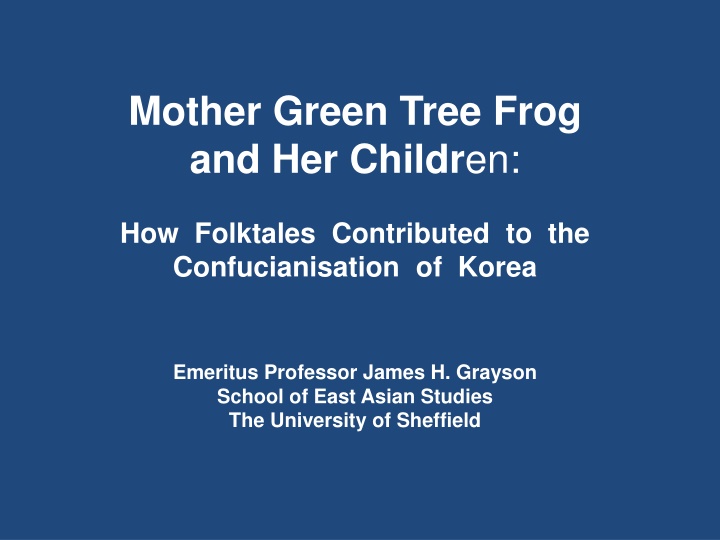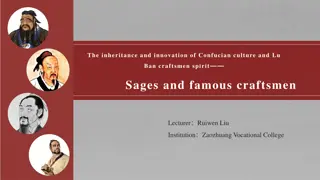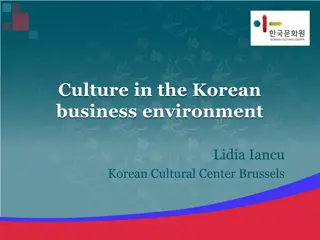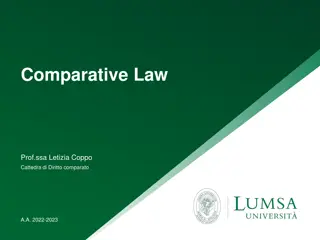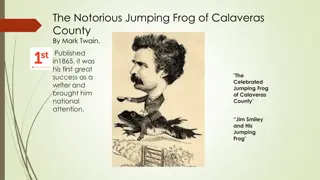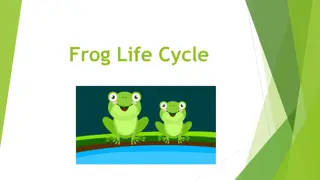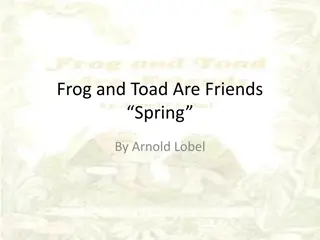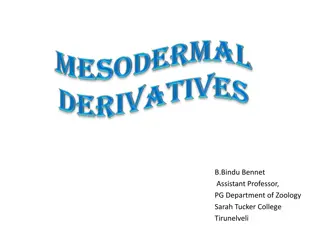The Green Tree Frog and Confucian Values in Korean Folktales
The folktale of the Green Tree Frog illustrates themes of filial piety and obedience to parents, reflecting Confucian values present in Korean society. Through the story of the unfilial green frog sons, the importance of honoring one's parents and fulfilling their last wishes is emphasized, showcasing traditional Korean values. This narrative highlights the role of folklore in conveying cultural norms and promoting social harmony.
Uploaded on Sep 18, 2024 | 2 Views
Download Presentation

Please find below an Image/Link to download the presentation.
The content on the website is provided AS IS for your information and personal use only. It may not be sold, licensed, or shared on other websites without obtaining consent from the author.If you encounter any issues during the download, it is possible that the publisher has removed the file from their server.
You are allowed to download the files provided on this website for personal or commercial use, subject to the condition that they are used lawfully. All files are the property of their respective owners.
The content on the website is provided AS IS for your information and personal use only. It may not be sold, licensed, or shared on other websites without obtaining consent from the author.
E N D
Presentation Transcript
Mother Green Tree Frog and Her Children: How Folktales Contributed to the Confucianisation of Korea Emeritus Professor James H. Grayson School of East Asian Studies The University of Sheffield
William R. Bascom (1912 1981) The Four Functions of Folklore Journal of American Folklore v. 67 (1954), pp. 333-349. 1. Amusement / Entertainment. 2. Validation of Cultural Values. 3. Education of the Hearer. 4. Conformity to Cultural Norms and Patterns of Behaviour. [5. Social Criticism.] See James H. Grayson, They First Saw a Mirror: A Korean Folktale as a Form of Social Criticism , Journal of the Royal Asiatic Society Third Series v. 16 (2006), pp. 1-17.
Core Confucian Values Lunyu ( ), The Analects of Confucius (5c BC) The Five Relationships Three Core Values In (Ren, ) = Benevolence. Hyo (Xiao, ) = Filial Piety. Ch ung (Chung, ) = Loyalty.
Why The Green Tree Frog Croaks Long ago in a certain place, there were some green tree frogs. The green frogs were famous for being unfilial. If their parents said go to the east, they went to the west; if they said to go to the mountain, they went to the plain; if they said to go the plain, they went the mountain. From the first to the tenth, they all were insubordinate to their [parents ] words and did exactly the opposite [of what they were told ].
Why the Green Frog Croaks - 2 One day, mother became ill and was about to die. Mother called her frog sons together and earnestly entreated them as her last words, When I die, don t bury me on the mountain; bury me on the river bank. Because the green frogs always did the opposite [of what they were requested to do], if they were asked to bury [her] on the mountain, they would bury [her] in the end by the river. Therefore, her death wish was that they must bury her by the river so that they would bury [her] on the mountain.
Why the Green Frog Croaks - 3 As soon as mother died, the green frogs regained their senses. [The green frogs] thought that, because of their unfilial actions they had made [their mother s life] miserable, shouldn t they keep her death wish? Saying that this time they must listen to [mother s] words, they built a tomb by the riverbank. After that, if the weather were foul, or if rain fell, the green frogs worried that their mother s tomb would slide [into the river]. That is why when it rains the green frogs cry sadly. Source: Im Tonggw n Han guk i mindam [Korean Folktales] (1972), p. 155. Translation in James H. Grayson Myths and Legends from Korea: A Compendium of Ancient and Modern Materials (2002), pp. 256-257.
Why the Green Frog Croaks - Structure 1) The lives of the young green tree frogs. 2) The death-bed request of their mother. 3) The repentance of the young green tree frogs.
Why the Green Frog Croaks - Comment 1. Validation of Cultural Values - Filial Piety (Hyo). If frogs have a society with civilised values, how much more should young children observe the rules of propriety. 2. Conformity to Cultural Values - Continued (eternal ??) psychological punishment for not being filial . Stress. Worry. 3. Amusement - We know what they should do, why don t they? Humorous outcome from a lack of awareness. 4. Education - This is why frogs croak. Re-inforces value of hyo.
The Squirrels Gratitude A poor, old couple lived alone without any child. On day, they saved a squirrel from a weasel and took the squirrel home to take care of it. Many years passed. The number of squirrels had increased greatly making it difficult for the old couple to take care of them all. The couple asked the squirrels to go out [to get their own food], and the squirrels obeyed. Each squirrel brought back a grain of rice. The squirrels kept bringing rice for the old couple until they died. When the couple died, the squirrels held a funeral for them and went back to the mountains. Source: Sim irin, Chos n tonghwa taejip [A Survey of Korean Folktales] (Keij [S ul], Hans ng tos ,1926). Translation in James H. Grayson, Myths and Legends from Korea: A Compendium of Ancient and Modern Materials (2001), p.296.
The Squirrels Gratitude - Structure 1. A childless couple raises a squirrel. 2. The squirrels support the couple in their old age. 3. The squirrels bury the couple upon their death, and give them an appropriate funeral ceremony.
The Squirrels Gratitude - Comment 1. Validation of Cultural Values - Filial Piety (Hyo). If squirrels can behave according to civilised values, that is, they can respect those who care for them as parents, how much more should young children observe these rules of propriety. - Benevolence (In). A sign of civilised behaviour is kindness to animals.
The Brothers Hngbu and Nlbu Long, long ago, there were two brothers. The older brother was called N lbu, and the younger [brother] was called H ngbu. The older brother, despite being very rich, was an extremely greedy and vindictive man who constantly caused trouble for his neighbours. On the other hand, his brother was poor, but very kind-hearted. H ngbu was very hard worker, but for some reason he didn t have much luck. His wife and children knew no days but hungry ones. They led a very pitiable life.
The Brothers Hngbu and Nlbu - 2 One day, just after H ngbu had returned from work, a snake appeared and began to attack a swallow s nest. The swallow and almost all her young were eaten alive. Only one young swallow narrowly escaped death. Even still, the young swallow had been injured. When it was fleeing, it leg had got caught in a bamboo blind and it had fallen to the ground. Seeing this, H ngbu quickly brought some ointment and rubbed it on the swallow s wounded leg. Then, he carefully wrapped some string around it to give it some support. The he carefully placed the young swallow back in the
The Brothers Hngbu and Nlbu - 3 Nest. In due course, the day came for the swallows to fly south . The swallow at H ngbu s house, now fully recovered, flew off in fine spirits. In due course, winter passed, spring came, and it was the third day of the third lunar month. The swallow which H ngbu had helped also flew back chirping cheerfully. H ngbu was delighted. Then the swallow dropped a gourd seed on the ground. Thinking that this was strange, H ngbu picked up the seed and planted it in the garden.
The Brothers Hngbu and Nlbu - 4 After a few days, the seed began to sprout. The plant began to grow at a great rate. It pushed forth leaves and flowers, and eventually it bore five large gourds. Realising that they were indeed wondrous gourds, [H ngbu] consulted with his wife about what thy should o. Those gourds are many times larger than regular ones. Maybe we should cut one open to see if there might be something inside. No sooner had hey cu open the gourd when rice began to flow out of the gourd. They filled five huge
The Brothers Hngbu and Nlbu - 5 containers, but there was still lots remaining. They took another gourd and cut it open. This time, it was gold which flowed out in large quantities. H ngbu and his wife danced with glee. Taking a third gourd, they cut it open. This time, a beautiful nymph appeared. Looking at the two remaining gourds, she said, Come out! Come out red and blue bottles! Come out! With that, one of the gourds rolled over by itself and split itself in two. A red bottle appeared from the
The Brothers Hngbu and Nlbu - 6 centre of the gourd and announced, Here I am! Then in the same fashion, the other gourd opened and a blue bottle appeared. Then the nymph said, Now you must build a huge mansion here. No sooner had she said this, when out from the blue bottle came a number of carpenters. Then from the red bottle out came a large quantity of timber. In no time, [the carpenters] built a splendid house. Then everyone returned to [their places]. The nymph disappeared in a puff of white smoke into the blue bottle.
The Brothers Hngbu and Nlbu - 7 After that, H ngbu became a man of wealth. He and his family lived happily and wanted for nothing. However, when his elder brother N lbu heard the news, he came immediately to H ngbu s house. He demanded to be told how his younger brother had managed to become so rich in such a short span of time. Hey, you! How on earth did you do it? It s a miracle. Tell me now how you did it . H ngbu told him all about the injured swallow and what had happened afterwards.
The Brothers Hngbu and Nlbu - 8 Hearing that story, N lbu went home and decided that he too would gain great wealth. So, he immediately built a swallow s nest and waited for a swallow to come and make its home there. Then it happened that one unfortunate swallow did come and hatched some baby swallows there. In due course, N lbu threw one of the swallows from the nest and broke its leg. Then he rubbed some ointment on the injured leg, wrapped it up with string, and placed the bird back in its nest.
The Brothers Hngbu and Nlbu - 9 Winter passed and N lbu s swallow returned in the spring. [The bird] dropped a gourd seed in front of the waiting N lbu. N lbu immediately planted the seed. Things continued to happen just as H ngbu had described. Then, when the gourds appeared, N lbu split open one [gourd] to see what was inside. However, out of the gourd came many little imps wielding sticks. We must punish you for your greed , they said and beat him mercilessly. Then the imps disappeared.
The Brothers Hngbu and Nlbu - 10 Convinced that the other gourds contained gold, N lbu struggled and managed to open another gourd. This time a large group of debt collectors appeared. Give us money, repay your loans or we will take everything you have . Eventually, they took everything and left. N lbu, thinking that everything would be alright if he could just open up the other gourds, split open the third gourd. This time, a flood of dirty, smelly water poured from the gourd and deluged the house.
The Brothers Hngbu and Nlbu - 11 N lbu couldn t take anymore and ran to H ngbu s house for help. His compassionate brother took pity on him and welcomed warmly. The greedy brother reflected on his deeds and was very sorry for everything which he had done which was wrong. From then on, he became a very humble person. H ngbu divided his fortune equally with his brother and both of them lived happily ever after. Source: Ch oe Inhak, Ch sen Mukashi-banashi Hyakusen [A Collection of Korean Folktales], (T ky , Nihon h s shupan, 1974), pp. 193-197. Translation in James H. Grayson Myths and Legends from Korea: An Annotated Compendium of Ancient and Modern Materials, (Richmond, Curzon, 2001), pp. 322-325.
The Brothers Hngbu and Nlbu - Structure 1) Virtue of the younger brother. 2) The reward for the younger brother s virtue. 3) The evil intent of the older brother. 4) The punishment of the older brother. 5) Repentance of the older brother and restoration of brothers true relationship. Double contrastive narrative structure.
The Brothers Hngbu and Nlbu - Comment 1) younger and be a model for him. In and ch ung . Validation of Cultural Values Older brother should look after 2) punished for greed and lack of concern for younger brother. Enforcement of Conformity to Cultural Values Elder brother is 3) younger brother has in and ch ung, and becomes a model for elder brother who repents. Social Criticism Elder brother doesn t act like an elder brother, but
A Fight Between a Centipede and a Toad Long ago, in a village there lived a poor mother and daughter. They were so poor that there were more times when they didn t eat morning and evening meals than there were times when they ate morning and evening meals. One year, the rainy season was especially long. One day the rain was coming down especially strong. A toad came into the kitchen. The daughter had a feeling of loathing come over her and thought of putting the toad outside.
A Fight Between a Centipede and a Toad - 2 Even though he was a small creature, she took pity on him. She gave him some of the remains of their meal and raised him [as a pet]. Even though they were poor, they were not stingy. Because the toad was thankful that they gave him rice, he did not leave [their house]. The toad grew up to be quite healthy.
A Fight Between a Centipede and a Toad - 3 [One day,] when [the girl] got up in the morning, [the toad] seemed bigger than the night before. She thought that if the toad got any bigger he would be the size of a calf. Even though the toad ate more and more as he got bigger, the mother and daughter didn t give the slightest indication that they disliked [the toad]. Every day without fail, they gave [the toad] some rice.
A Fight Between a Centipede and a Toad - 4 Behind the village, there was a mountain. In this mountain there was an enormous centipede which had lived for several thousand years. Because the centipede had the power of bringing fortune and of bringing rain, the villagers had built a shrine in the mountain and offered up rituals to the centipede. They firmly believed that if the centipede was properly propitiated, the harvests would be good, and that woodcutters would be protected from attack by animals.
A Fight Between a Centipede and a Toad - 5 There was the custom that once a year there was a grand ritual at which a village maiden was offered up to the centipede. The maiden was thought of as the wife of the centipede and was not able to be married to anyone else. This particular year, the maiden who fed the toad had been selected to be the bride of the centipede. The maiden was very sad. Her future was dark.
A Fight Between a Centipede and a Toad - 6 Because she was to be the bride of the centipede, she would have to live a solitary life. The villagers felt that she had to do this because it was for the benefit [of everyone]. One couldn t reject this custom, nor do anything about it. It was the day of the grand ritual. The villagers prepared the altar, and playing music entered in great numbers into the shrine. The maiden looked to her side without thinking.
A Fight Between a Centipede and a Toad - 7 The toad had followed her and was at her side. The girl asked the toad what she should do, but there was no response. The villagers left, and it became very dark. The girl was wrapped up in the dark and in fear. Because she was unhappy and terrified, her body began to shake. The toad was beside her and was thinking about what it had to do in the future. It became midnight. In the darkness, a strange sound arose and a
A Fight Between a Centipede and a Toad - 8 centipede with countless legs appeared at the door. He had come to get the maiden. The girl s body shivered all over. From the centipede s eyes a green light shone. The centipede saw the toad and stopped. The toad which had seen the green light shining from the centipede s eyes went forward in a peculiar way towards the centipede and began to fight it.
A Fight Between a Centipede and a Toad - 9 The centipede spat out poison, and the toad also spat out poisonous spittle. In the midst of the sounds of the mountain and the cries of the wind, the centipede and the toad fought to the bitter end. The maiden was so scared that she fainted. The next day, the villagers gathered in front of the shrine. There was a strange scene all around. The centipede and the toad had fought, had drunk in poison and had died. The maiden was in a swoon. They
A Fight Between a Centipede and a Toad - 10 woke her and gave her some gruel. The toad had repaid the maiden s kindness by bravely fighting with the centipede and had died. The people of the village took the toad, placed it in a good spot and gave it a funeral. The centipede was burned in the fire. For the next three months and ten days it is said that the smell of the fire could be smelt all over the heavens.
A Fight Between a Centipede and a Toad - 11 As the centipede which the villagers had been afraid of for a long time was dead, the custom of offering up rituals to the centipede was abolished. It is said that because of this the custom of sacrificing a young maiden was also abolished. Source: Im Tonggw n Han guk i mindam [Korean Folktales] (1972), p. 121 122. Translation in James H. Grayson Myths and Legends from Korea: A Compendium of Ancient and Modern Materials (2002), pp. 274-276.
A Fight Between a Centipede and a Toad - Structure 1) Bond between maiden and toad. 2) The sacrifice of a maiden to a beast for the benefit of the community. 3) The battle between the beast and the toad. 4) The abolition of the practice of human sacrifice.
A Fight Between a Centipede and a Toad - Comment 1. Validation of Cultural Values - Loyalty (Ch ung). If a toad could understand the civilised value of loyalty to a superior and to be grateful for kindness, how much more should young children be able to understand this value. - Benevolence (In) A sign of civilised behaviour is kindness to animals.
A Fight Between a Centipede and a Toad - Comment 2 2. Conformity to Cultural Values - If society gives recognition to an animal who understood that loyalty is a core value, you too will be rewarded . 3. Amusement / Entertainment - Creepy thrills. 4. Social Criticism Civilised people don t sacrifice people to gods. 5. Education - We are a civilised people who don t sacrifice people to gods.
